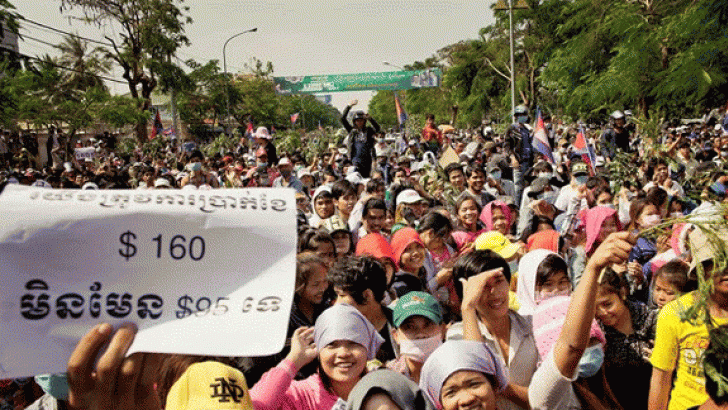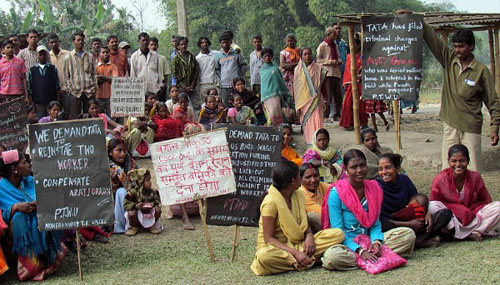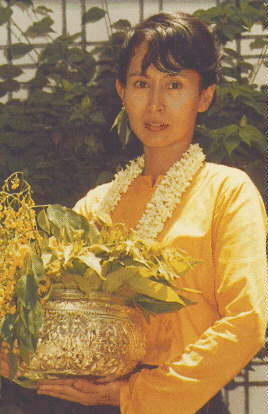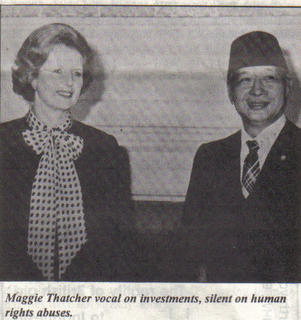Papuans Struggle for Freedom, but Big Business Scrambles for Profits
BURNING VILLAGE. Indonesian troops bringing 'order' to West Papua.
The late Billie Holiday sang about the racism and lynchings in America's South, in Abel Meeropol's song Strange Fruit. Maybe some West Papuan singer will yet record a song about the strange things fished from the sea off their brutally occupied country.
The body of Martinus Yohame was found in a sack floating in the sea near the city of Sorong, West Papua on August 26. Yohame, head of the Sorong branch of the West Papua National Committee, KNPB, had been mising since August 20.
See Report by Amy McQuire in Australia.
It's not hard to guess who might have been responsible his disappearance and death. The island of Papua/ New Guinea was carved up in colonial times. The eastern side, having been under British and German rule, became an Australian-administered territory, but today is the officially independent state of Papua New Guinea. Though its people remain poor and their country undeveloped, the mineral wealth beneath it have made it one of the world's fastest-growing economies in recent years.
West Papua remained under Dutch control until Indonesian troops invaded it in 1961. With UN connivance the people's right to self-determination was ignored, in favour of a rigged plebiscite of tribal elders selected by the Indonesian military. West Papua became a province of Indonesia, initially as West Irian Jaya. With US and British arms, the Suharto dictatorship suppressed the people, and brought in settlers from Java.
An estimated 500, 000 Papuans were killed by Indonesian forces. But then that's about the same as the number of Indonesian worker and peasant communists slaughtered after the CIA-backed coup which brought Suharto to power in Indonesia.
The end of Suharto's rule brought some easing of political tyranny in Indonesia proper, and West Papua regained its own name, but the Indonesian occupation remains, and Papuans can be severely punished simply for raising the flag of independence. Indonesia's rulers are intent on developing and exploiting west Papua's resources in partnership with Western business corporations.
Martinus Yohame was one of those opposing Indonesian rule of his country. Amnesty International said his disappeance coincided with the detention of another independence activist in the lead-up to Indonesian President Susilo Bambang Yudhoyono’s visit to the region. Yudhoyono was to attend a sailing event in Sorong.Yohame had reportedly staged a press conference in Sorong the day before he disappeared, opposing the President’s visit and raising the issue of illegal logging.
The KNPB were reportedly planning demonstrations, including the raising of the banned “Morning Star” flag, an act for which others have been jailed by the Indonesian government. Two school students were arrested earlier this month for painting pro-independence slogans. Amnesty says Robert Yelemaken, 16 and Oni Wea, 21, were beaten by the arresting police officers, and forced to roll in dirty water and drink paint. Yelemaken has been released but Wea is still incarcerated and facing charges of “incitement”.
Villages Burned
www.youtube.com/watch?v=zXbPac6K-9M
A new video sent out by West Papuans from the Pirime District of the Lanny Jaya Regency in West Papua shows scores of West Papuan villagers in hiding after the Indonesian military burned down their houses in a military operation.
http://freewestpapua.org/go/924
Foreign journalists are banned from reporting from West Papua, and two French journalists are being held by the Indonesians, accused of "espionage".
This can hardly excuse the kind of fawning report published in one Australian newspaper:
"Indonesian president-elect Joko Widodo has promised to build a presidential palace on the shores of West Papua's picturesque Lake Sentani as a sign he will pay more attention to the resource-rich but troubled region.That's from the Fairfax-owned Sydney Morning Herald.
The plan, which includes regular meetings for dialogue with Papuan leaders, has met a mixed reception from senior local figures.
A low-level armed separatist movement has racked West Papua since the 1960s, prompting a huge security presence in the province. Foreign journalists are virtually banned from going there, ostensibly for security reasons, and rampant corruption and discrimination impoverishes the Melanesian-Christian ethnic majority.
Read more: http://www.smh.com.au/world/joko-widodo-promises-to-focus-on-west-papua-20140823-107jd0.html#ixzz3CEJdO2yC
And Tory Prime Minister Tony Abbott has said West Papuan freedom campaigners are not welcome in Australia.
But then as one Aussie comments:
"The Federal Government on behalf of all of us Australian taxpayers (which does not incidentally include the super-rich, for whom tax paying is an optional activity) gives Indonesia (read the Javanese Empire) something between $600M and $605M per year, labelled as 'aid'."
And it would seem the government and business interests are less interested in attaching human rights strings to that 'aid' than in making sure they get their money's worth (even if it is not their money) in the shape of business deals, contracts and mining concessions in Indonesia and its colony of west Papua.
Fortunately, many Australians, and many people in Pacific island states, are taking a different kind of interest in West Papua, and supporting its people's rights.
See also:
http://www.theguardian.com/commentisfree/2014/apr/28/west-papua-my-people-need-australias-help-before-it-is-too-late
Benny Wenda’s Statement on murder of Papuan leader Martinus Yohame
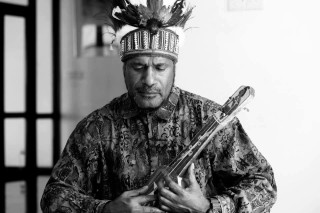
Dear friends, supporters and fellow Papuans.
It brings me great sadness to learn that last week, our dear friend and brother, Martinus Yohame was found murdered after being kidnapped by the Indonesian security forces in West Papua.
It is an act of extreme evil to abduct and kill someone just because they are peacefully speaking out for their human rights to self-determination and on behalf of the Free West Papua Campaign I fully condemn his murder and demand that those responsible be brought to justice.
I would like to thank Amnesty International for joining the call in demanding justice for his case and in helping to further defend the rights of our people.
Martinus Yohame was a true freedom fighter of the West Papuan people who died not for himself but for the whole nation. He will be missed by us all.
Martinus was the Chairman of the West Papua National Committee (KNPB) in Sorong and always mobilised the Papuan people to resist Indonesian State oppression.
On 20th August 2014, he gave a press conference, declaring that the people of West Papua refused the Indonesian president (who was arriving near the Sorong Region).
Martinus always called publicly for a Free West Papua and strongly condemned Indonesia’s destruction of our natural environment.
Just for making such comments, Martinus was kidnapped by suspected members of the Indonesian security forces the next day.
His body was found on 25th August, floating in the sea after he was tied up and shot several times, with his face smashed in.
How can the Indonesian government claim to be a democracy when they commit such evil brutality against peaceful activists?
When I hear about the murders of more and more of my people, I am always full of sadness and grief.
How can they do this to human beings?
Tomorrow, the Free West Papua Campaign will be holding a protest outside the Indonesian Embassy in London, United Kingdom to demand justice for the murder of Martinus Yohame and an end to all the killings of our people.
We will meet at 12:00 outside the Indonesian Embassy at 38 Grosvenor Square and call for a Free West Papua.
I urge all supporters around the world to also hold similar demonstrations against the killings and in support of justice and freedom for West Papua, in memory of the life and vision of Martinus Yohame.
We lost a great freedom fighter and our hearts are full of grief but we remember that his death was never in vain and that his vision will continue to inspire the new generation of young West Papuans to stand up and struggle for freedom as he did.
On behalf of the campaign, I give my sincerest and deepest condolences to the family of Martinus Yohame, who never got to see him in a Free West Papua.
In your hearts and our hearts, he lives on today and his dream is the dream of all our people.
It was not fulfilled in his lifetime but with his spirit, and the spirit of every Papuan; we will continue to struggle on until the dream of a Free West Papua becomes a reality.
Today we cry, but I am certain that one day we will celebrate together in a Free West Papua and remember the sacrifices of the brave martyrs like Martinus, who died for our freedom.
Farewell Martinus Yohame, you have given the ultimate sacrifice for our people, dying for the freedom of West Papua.
May you rest in peace. Your struggle is our struggle and we will always remember you as we continue this campaign for a Free and Independent West Papua, once and for all.
Benny Wenda
www.bennywenda.org

